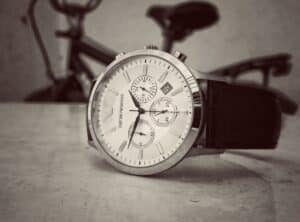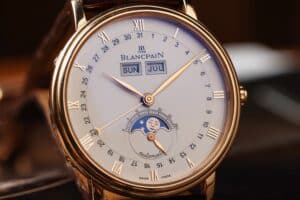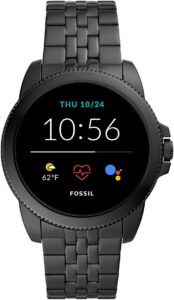Last Updated on November 26, 2024 by Luis Cooper
Looking for the best Digital vs. Analog Watches:
Which Watch is Best for You?
You’ve come to the right place.
Watches are worn for a variety of purposes.
Some people choose to wear a watch to keep track of the time, while others prefer it for fashion.
Whether you prefer to wear a watch for time or prefer it for fashion, it is essential to know about the main categories of watches.
The watch industry is broad and offers a wide range of products.
However, all watches are broadly classified into digital and analog watches.
The analog watch has a mechanical mechanism, whereas the digital watch has a quartz movement.
Movement is not the sole characteristic that distinguishes these two groups; numerous other factors also play a role, like their cost, time accuracy, and even mechanical complexity.
If you’re confused about which watch category to purchase, you’ve come to the perfect place.
After reading this, we guarantee that you are not confused about digital vs. analog watches and which watch is ideal for you to buy.
This article explains Digital vs. Analog Watches: Which Watch is Best for You?
What is a digital watch?
Digital watches are a modified or modern form of traditional watches that display the time digitally.
A digital watch uses an LCD or LED screen for displaying time.
A digital watch uses the quartz movement for its work.
Digital timepieces have progressed dramatically during the last decade.
We now equate digital watches with smartwatches like the Apple Watch and the Samsung Galaxy Watch.
Heart-rate tracking, workout tracking, and voice-activation technology are just a few of the advanced features available on these watches.
What is an analog watch?
The analog watch is the most conventional type of timepiece for displaying time.
The time is represented by the minutes and hour hands on the analog watch dial, which contains digits ranging from 1 to 12.
As the minute hand moves, it also makes a ticking sound.
Different analog timepieces have different numbers or features for the display of time.
Some have roman digits, others have Arabic numerals, and others use diamond stones instead of numbers.
Analog and digital technology:
The universe in which we live is analogical.
When you look at the characteristics of nature, you can see that there are unlimited options.
Our senses experience the world around us in analogy to humans.
We can hear many noises, infinite feelings, and even an infinite number of colors we can see (even if the difference is indiscernible to the eye).
There is no set limit, and things are discovered regularly.
Analog signals are used to represent or analogize digital signals.
For example, if you measure your height by a doorway and make a pencil mark on the top of your head, the space between the marks isn’t you but rather a representation of your height.
Digital is distinct in that it saves information in the form of numbers (digits).
Digital signals and things exist in the discrete and finite realm.
The number of possible values must be restricted; it can range from two to any number, but not infinity.
In addition, analogies are frequently employed when referring to non-digital objects.
An analog watch depicts the passage of time by sweeping the hands over a designated dial, with the amount of movement determining the time.
It is an analogy of time rather than time itself.
A digital watch likewise uses numbers to indicate the passage of time (digits).
Digital vs. analog watch: which is more accurate?

Digital timepieces are unquestionably more accurate than analog watches.
The quartz movement is significantly better and more accurate than the analog watch’s intricate gear.
Quartz is undoubtedly less expensive and easier to use, but it outperforms the competition in terms of accuracy.
The movement alone determines accuracy.
If you have a quartz analog watch and a quartz digital watch, the digital watch will not be more accurate merely because the time is shown differently.
Only a mechanical analog watch and a quartz digital watch can be used to compare the accuracy of analog and digital timepieces.
Because quartz is the most exact movement, the digital product is likely to be more accurate in this circumstance.
Analog watches, on the other hand, can be quartz.
Therefore comparisons between the two are useless.
Digital vs. analog watch:
Features:
This is where things begin to get interesting because digital and quartz watches can have a lot of features while still being reasonably priced.
A classic watch can grow pricey as the number of functions increases.
A stopwatch that may be operated through buttons is one of the features of quartz watches with analog dials.
Dates and days are also displayed on these timepieces.
Quartz watches also include a built-in alarm mechanism.
They can show the user multiple time zones and include a calendar.
On their LED or LCD panels, digital watches have an inbuilt illumination system.
So, it is much better to use a digital watch rather than a mechanical watch which makes it difficult for the user to display the time at night.
As a result, the best digital watch is one that includes all of these functions.
Analog watches also have many features in them.
Minute and hour hands are typical, but optional features include date and day, a stopwatch with split times, a countdown timer, a display showing the moon phase, and a second hand showing GMT.
Digital vs. analog watch:
Fame:
The analog watch is the oldest type of timepiece ever created.
It can also be described as a classic timepiece.
The history of watchmaking began with the development and production of conventional analog timepieces, which featured a distinct style with gorgeous displays and lovely ticking noises.
In terms of fame and reputation, digital watches, on the other hand, differ from analog watches.
They are simply valued for their superior technology and capacity to display much information other than time display.
Digital vs. analog watch:
Glamour and Aesthetics:
For people who enjoy vintage aesthetics, an analog non-digital wristwatch is preferred.
With its classic hour and minute hands, the analog watch exudes a level of sophistication that digital watches lack.
The analog watch can easily be worn on formal occasions.
Digital watches, on the other hand, will appeal to those who enjoy modern fashion.
Digital dials are enthralling because of their luxurious features. On a simple analog dial, these features couldn’t be duplicated.
Advantages of digital watch:
• Digital watches are less expensive than analog timepieces.
• The structure and design of a digital watch are more durable.
• Some digital timepieces may run solely on solar energy, while others are hybrid.
• Athletes are the ones who will profit the most from wearing a digital watch.
• Digital watches have extra features like alarm clocks, stopwatches, calendars, etc.
• Milliseconds and compass are just two examples of detailed information provided by digital timepieces.
Disadvantages of a digital watch?
• Due to the plastic materials used in their manufacture, low-cost digital timepieces are less durable and attractive.
• The target market for digital timepieces is frequently tiny. Men between the ages of 10 and 40 and people in blue-collar jobs are frequent wearers of these watches.
• Digital watches have a relatively low character. As a result, they are not frequently accepted or used for formal occasions.
• Because they work with electronic systems, they can break down if exposed to heat or use low-quality batteries.
Advantages of the analog watch:
• You can keep many watches with different color dials, and they all have their personality.
• Analog watches have more design and style variation than digital timepieces.
• Analog watches are made for many kinds of occasions, and they contribute to the attractiveness of your personality.
• Analog watches have a particular gravitas that makes you appear more compassionate.
• Because of their casing and materials, analog watches are more durable and rugged than digital watches.
Disadvantages of the analog watch:
• Analog timepieces may have an issue with time precision.
• Analog timepieces are pricier than digital watches.
• Analog watches are more valuable than digital watches in terms of money.
• In the dark, certain antique analog timepieces are unreadable.
• In the dark, your watch is worthless.
• Some analog timepieces lack stopwatches and calendars, common in digital watches.
Final Results:
If you want to add refinement to your look, an analog watch is a way to go.
You can change the color of the watch dial to match your personality; for example, calm people prefer grey or blue dial watches.
Color-loving people go for sporty-looking dials in yellow, orange, or merely black.
Try digital watches if you only want to observe the time and manage your daily routine and don’t care about appearances.
So it comes down to personal preference and affordability when it comes to digital vs. traditional watches.
Quartz analogs will keep excellent time, but they will never have the “wow” factor of mechanical analogs.
On the other hand, a Smartwatch is the one for you if you want to manage your life with a few clicks on your timepiece.
If you have any questions, please ask in the comments below.
Related posts:
How To Buy The Right Size Watch For Your Wrist:





1 thought on “Digital Vs. Analog Watches: Which Watch is Best for You?”